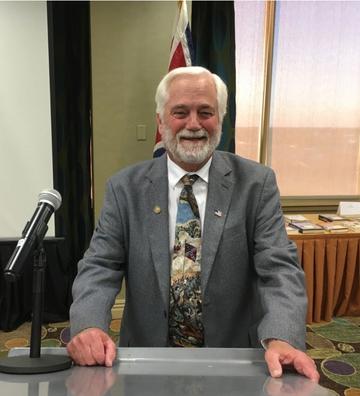October 2019

At our dinner meeting held on October 22nd, Round Table member Lane Smith gave a veiy interesting program titled: "The Trial of Jefferson Davis and the Issue of Secession."
Lane said much of his information came from the book titled: The Impending Crisis, 1S4S-1S61 by David M. Potter, published in 1976. The book covered the tune period from the War with Mexico to the start of the Civil War. The War with Mexico brought new issues. Would the new territories be free or slave states? Politics became very hostile. Important issues could not be resolved.
Lane asked the following questions:
- Do cultures change from generation to generation? There is a huge gap in generational thinking.
- Do circumstances and political issues change the culture? The U. S. Constitution changes with the culture. The application for today's culture is different than the way the Constitution was written originally.
- Do opinions and thought processes change from generation to generation?
- Do we view slavery or secession as they did in the 1800's or do we view slavery as a window in 2019? In the 1800's, slavery was an instihrtion. Today, we view slavery as an evil institution.
- Is the Holy Bible or the Ten Commandments looked at differently today versus when the Holy Bible was written?
- Nationalism: Has it changed? For the southern states, their loyalty was to the south and not to the country. Robert E. Lee's loyalty was with Virginia. Many looked at loyalty in that manner.
- Did the south have the right to secede? Are we looking at secession from the 1800's or today?
Lane said the United States had just fought a war with Great Britain. This nation, once it gained its freedom, had a great fear of a strong central government.
Now the Civil War is over. Confederate President Jefferson Davis was captured in Georgia and imprisoned at Fort Monroe. The Union was going to place Davis on trial. He would probably have been found guilty and the Union intended to hang him. John Brown's raid on Harpers Ferry occurred on October 16, 1859. He was hung on December 2, 1859. Justice took only six weeks. Abraham Lincoln was assassinated on April 14, 1865. The conspirators were hung on July 7, 1865. Justice took 2 1/2 months. Many in the north expected the same swift justice for Jefferson Davis. There were those that wanted revenge. However, a strange thing happened. Two years after Davis was captured, there was no trial. He was released quietly. There was no justice at all. Why wasn't Davis charged with treason? Davis wanted a trial. He believed that he could prove that secession was legal. After Davis was arrested, the federal government realized they had a problem.
Lane asked: What is "States' Rights"? Southerners believed that each state had frill sovereignty. States were sovereign, not the Federal government. States had authorized the Federal government to act as then agent. States had never transferred sovereignty to the Federal government. The Federal government originally intended to establish that states could not secede. However, the perpetual nature of the government was not written into the Constitution. James Madison was against this provision and said states would not ratify the Constitution.
The defense by Jefferson Davis would have considered the following:
- The Articles of Confederation, 1777-1781. Each state maintained sovereignty. The Federal government had limited power. The Federal government derived power from the states.
- The Paris Peace Treaty of 1783. The treaty named each of the 13 states and each state was considered sovereign.
- The U.S. Constitution, 1788. The Constitution was ratified separately by each state. There was fear of a strong central government.
- The Proceedings of the Constitutional Convention of 1787. Could the Federal government coerce a state not to secede? Robert E. Lee did not agree with secession, but he thought it was not constitutional to force states not to secede.
- The Virginia and Kentucky Resolutions of 1798. Each state was considered sovereign.
- In 1860, James Mason of Virginia claimed the Federal government was a compilation of individual states.
Now the trial of Jefferson Davis is over. The Federal government says it is perpetual in nature and states do not have the right to secede. The sentence is guilty and Davis is to be hung. However, in the United States, there is an appeals process. Davis' attorneys could appeal his case to the U.S. Supreme Court. Would they overturn the guilty charge? What if the defense is overwhelming that states have the right to secede? What if the Supreme Court rules in Davis' favor? What if Davis is found not guilty and states actually have the right to secede? Would the U.S. be willing to risk putting Davis on trial? Maybe it would be better to release Davis, rather than having a trial.
Lane asked: What if Davis had been found not guilty? We would probably have been two nations. Texas might have returned to the Federal government. The Confederate states cannot stop secession. This continent would be a confederation of weak, little states. Lane said this nation floundered to become the United States. This nation took 70 years to decide what kind of a nation it would be. From the American Revolution to the Civil War, we became a great nation.
In conclusion. Lane said we view things differently today as opposed to the way people viewed things back in the 1800's. Did the evidence show that the south had the right to secede? What if the Supreme Court had ruled in Davis' defense?